Welcome back to our bi-weekly series on Gene Roddenberry’s work between Star Trek incarnations. Last time we looked at the satanic bromance thriller, Spectre. This time we check out Gene’s original android with a heart of gold in The Questor Tapes.
If I had to sum up The Questor Tapes in one word it would be “bland”. I’m not saying the movie is boring or unimaginative. It’s just that after seeing Gene Roddenberry write about intergalactic navies, togaed, post-apocalyptic slavers, and sacrificial devil orgies, The Questor Tapes’ all-white cast in beige suits on mostly beige sets comes off as rather quaint. There’s no really way-out, sci-fi imagery in this sci-fi adventure until the last ten minutes. Even the main character’s choice of appearance is purposefully ordinary. In the long line of rejected Roddenberry concepts this seems like the safest bet for a wide audience more interested in stories grounded in reality than space opera. Too bad it didn’t pay out.
For this outing, Roddenberry teamed up with the original Star Trek’s second biggest creative mind, Gene L. Coon. Coon was the line producer in Trek’s first year and most of its second. He invented the Klingons and wrote some of the show’s most defining episodes. One thing that put the two Gene’s at odds and lead to Coon’s initial departure was Coon’s sense of humor. It got us great episodes like “The Trouble With Tribbles”, which Coon helped craft into a hit from a story that was mostly a rehash of a Heinlein short. But he was also responsible for the inappropriate bouts of laughter the entire bridge crew indulged in after some of their most dower adventures. Questor definitely has Coon’s finger prints all over it. It is the funniest of Roddenberry’s pilots, but when the humor misses, boy does it miss.
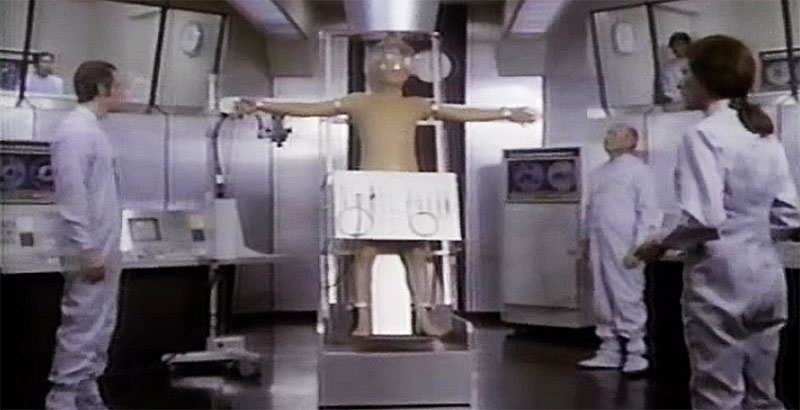
Questor begins, like Genesis II, with a scientific team in the middle of a major experiment. Unlike Genesis II, it omits any kind of narration and lets the audience glean what’s happening from the onscreen action and dialog – a huge improvement. The team is about to activate an android, the titular Questor, that was designed and programed by a Dr. Vaslovik before his disappearance three years earlier. Dr. Jerry Robinson, played by M*A*S*H’s Mike Farrell, is Vaslovik’s protégé and the main proponent for finishing his mentor’s work.
You know a movie is going to be mayonnaise on white bread when the guy who was the second choice to play second banana to Hawkeye Pierce is one of the stars. I mean, the only thing interesting about Captain B.J. Hunnicutt was his mustache and double entendre initials. It’s the same kind of casting that gave us the equally dull and listless Steven Collins in Star Trek: The Motion Picture. Roddenberry’s official story (pass the salt) on why Questor didn’t go forward is because NBC wanted to axe Farrell and make the android the only star. Roddenberry insisted on a team dynamic and bowed out of the production. How bad does an actor’s presence have to be that a network would prefer a blank-faced robot carry the entire series alone?
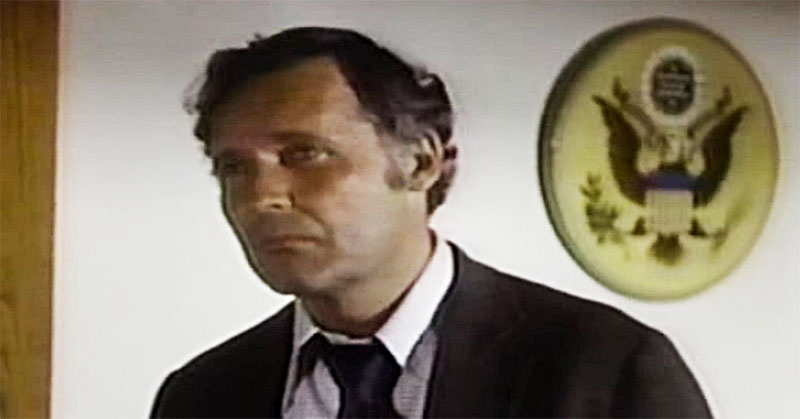
Against Robinson’s wishes, the team attempts to activate Questor using a firmware of their own design. Team leader, Geoffrey Darrow, doesn’t trust Vaslovik’s intentions and has decompiled the original firmware with no results beyond permanently deleting half of it. Darrow is Questor’s main antagonist, and is played by John Vernon, whose IMDB page is longer and more complex than a Tolstoy novel. When his custom firmware fails to activate Questor, Robinson finally convinces him to use Vaslovik’s original. When that doesn’t work the team wraps up for the night and heads home.
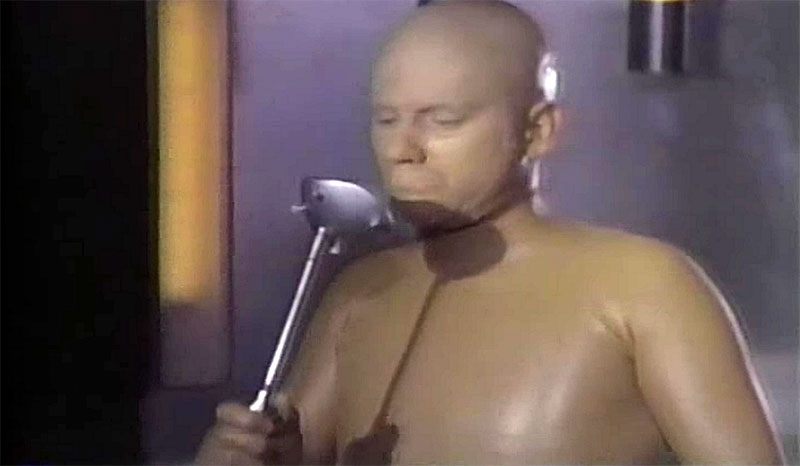
Questor, although programmed with only partial data, is indeed operational but playing dead. As soon as he’s alone he sets to work manufacturing his own physical features. Inexplicably, he chooses to look like Robert Foxworth. Despite the outcome, this is a pretty neat sequence where Questor seems to be searing on his individual facial features with a branding iron. The process sounds sizzlingly painful and makes the sequence all the more tense, especially since it’s not yet clear whether Questor can physically feel or not.
Foxworth-transformation complete, Questor heads for the university library in search of information concerning Dr. Vaslovik, whom he refers to as his “creator” in much the same way the Ilia probe refers to V’ger’s “creator” in The Motion Picture. Like Ilia, Questor’s voice is a robotic staccato that irritated me so much I wondered how the audience would have stood it week after week if the show had gone to series. Fortunately, as the librarian who catches him browsing microfilms notes, Questor’s voice becomes more naturalistic the more he interacts with people. That’s one of the interesting things about the Questor character. He’s subtly learning and improving before our eyes. Blink and you’d miss it, but it’s there.
Upon leaving the library, Questor has nothing to go on but a vague memory about Vaslovik being obsessed with a boat. Realizing his conversation with the librarian went badly, he decides he needs a human partner to help him on his mission to find his creator. Since Robinson was the person closest to Vaslovik, Questor makes him his next stop. This involves dispatching a security guard with what is, essentially, a Vulcan nerve pinch. While Questor is fully able to protect himself and his interests, he’s completely incapable of murder no matter how logical a solution it may seem to him.
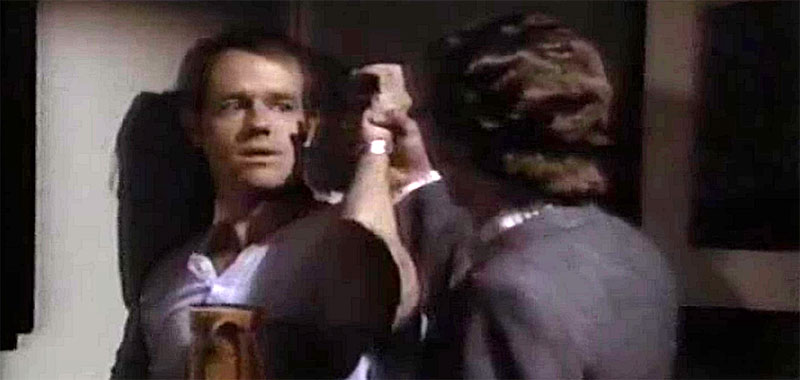
Questor basically abducts the shocked Robinson and forces him to use his credit card to buy them tickets to London. Immediately Robinson earns his keep, correcting Questor’s inhuman mannerisms, often in sincerely humorous ways. He turns lights on for Questor and pushes him to read more slowly because that’s what a human would do. Again, I tip my hat to Coon for this. Although neither Foxworth nor Farrell are master thespians, they do have an natural chemistry like most Roddenberry scripted duos do. They automatically compliment each other’s shortcomings with their own strengths much like Kirk and Spock, William and Ham, and Picard and Riker. But the easy and humorous interactions that really sell the relationship are most likely all due to Coon.
Darrow is quick to notice the missing Questor and Robinson and calls out an international warrant for them. This is the mysterious thing about Darrow, we never know exactly what he is. He’s presented simply as the team leader, but he has the ability to command the police, secret service, and military of various countries and put American troops anywhere on a whim. His powers are completely unreal but never explained. This would be fine if it weren’t for the movie’s odd ending, but I’ll touch on that later.
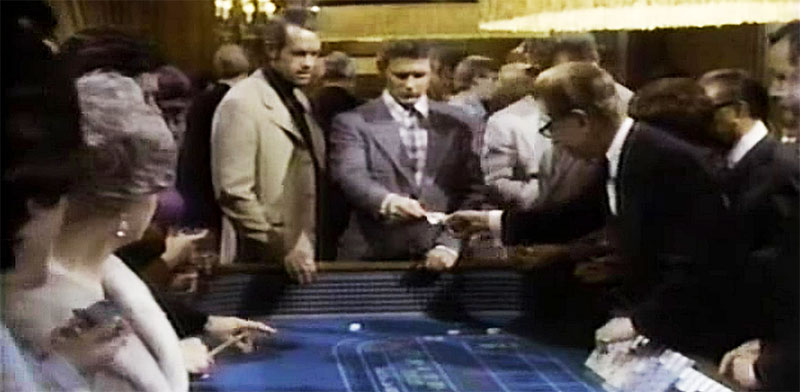
After landing in London and evading customs and the police, Questor and Robinson realize they need some cash in order to continue their mission. By some inane stroke of luck, they find themselves right next to a fancy casino. If you’re a fan of Star Trek: The Next Generation you’ll recognize the next scene as it was used, note for note, in the second season episode, “The Royale”. Questor cleans out the house by playing craps with a pair of loaded dice he “fixes” with his mathematical abilities and his strong, precise grip.
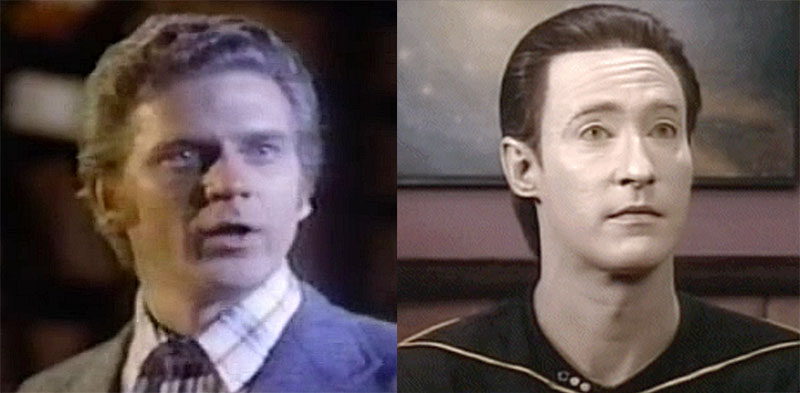
If you haven’t guessed yet, Questor is Lieutenant Data. Not a proto-Data or something Data-like. He is Data and Data is he. With both of them sharing wide, doe-like eyes, pouty, parted lips, and fidgety, mechanical mannerisms, you’d think Roddenberry sat Brent Spiner down with a copy of Questor and said, “Do that!” Like Data, Questor sees as much to admire about humanity as he does reasons to criticize it. His incomplete programming has left him without a full range of emotions, but just enough for him to know what he is lacking. The only real difference between the two is Spiner’s incredible voice work. Foxworth improves his robotic performance by the end of the film, but never reaches the melodic tones of Mr. Data, which combine a touch of the artificial with a sense of curiosity and whimsy. Data is special because he makes you love him despite his complete inability to love you back. It’s that tiny difference that makes Questor more like a computer than a character. I know he’s capable of great things, but I’m really not invested enough to care. Characters in the film do love him, by why don’t I? I really think it’s all in the voice.
The most likely person to know where Vaslovik went is an English woman by the name of Lady Helena Trimble. With the mere mention of Vaslovik, Helena sets Questor and Robinson up with a room in her palatial estate. At this point the cringingly inappropriate humor I mentioned earlier rears its ugly head. According to Robinson, Helena’s great wealth and power stems from her sexual relationships with wealthy, powerful men. A “courtesan” is what he calls her. Courtesan being the fancy word for “whore”.
Questor, because this is a Roddenberry production, is fascinated by human mating, and asks Robinson to seduce Helena into giving them the information on Vaslovik. He tells Robinson he is an “exceptional male” who is fully up to the task. Questor may not be able to feel or kill, but he can certainly lie. I mean, this is Mike Farrell we’re talking about. The guy’s entire emotional range oscillates between bewildered amusement and bewildered frustration.
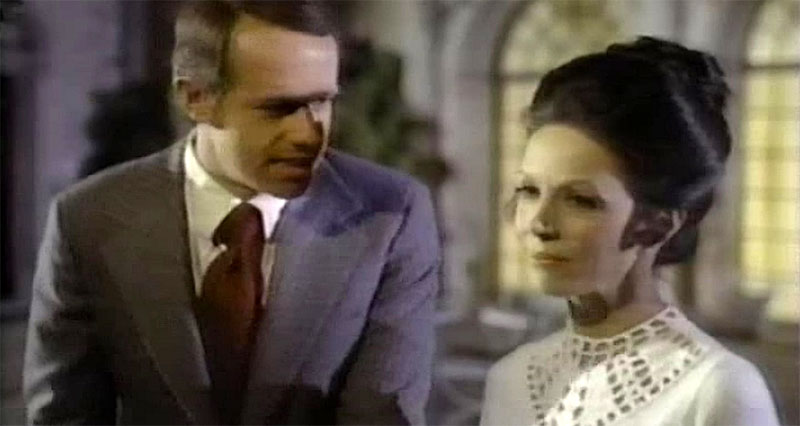
After a bit of uncomfortable flirtation Robinson realizes he shouldn’t manipulate another human being with sex to get what he wants, as if he stood a chance. So now it’s Questor’s turn at bat. Being a robot, Questor tells Helena point blank that he’s going to bone the information out of her, much to her amusement. She asks him if he’s even capable of such a thing to which he responds that he is – get ready for it – “fully functional”. It’s clear only Roddenberry could have come up with this whole seduction mishegas, but the joke wreaks of Coon.
The next morning Robinson runs upstairs to Helena’s boudoir to see if Questor really sealed the deal, and is shocked to find Helena alone. Turning the Roddenberry succubus trope on its ear, Helena is not actually a “courtesan” but just a really cool spy. She’s happily handed over not only everything she knows about Vaslovik to Questor, but a secret control room made specifically for him – and all in the name of friendship to boot. It’s a great place for Helena’s character to wind up, but did we need to take this inane trip to get there? Couldn’t she have just been a cool spy to begin with? It’s as if the two Gene’s are saying ,“You thought women were all whores, didn’t you?! Well, tada! They’re not!” as you’re left stammering, “But, I never said that. Why are you putting words in my mouth?”
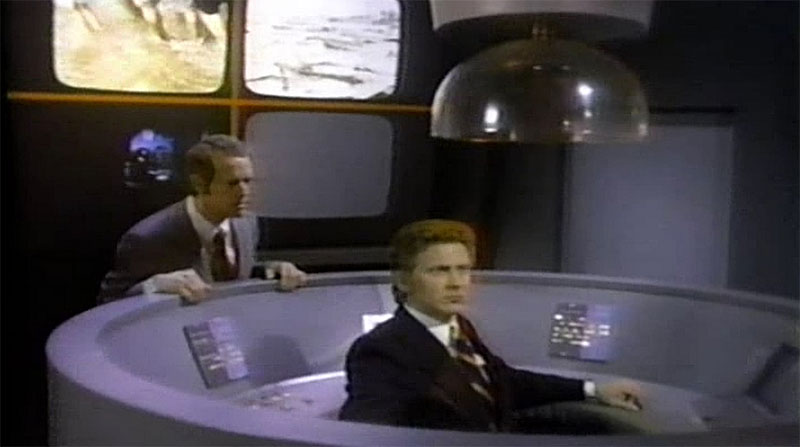
While Questor settles into his new digs just fine, Robinson is deeply disturbed by Vaslovik’s control center. Its many screens are tuned into important events and locations of power all over the world. The ability to spy on and manipulate governments and institutions is unprecedented. It smacks of evil genius, and Robinson, with all his moral purity, is not having it. He gets Darrow on the line and tells him where they’re located.
Even with the evil lair, Questor has no idea where Vaslovik went. The only information he could glean was that he is a ticking nuclear time bomb. If Vaslovik isn’t located in three days Questor will go off, destroying everything within a mile, to keep him out of “the wrong hands”. Seeing that the task will be impossible, Questor wanders off to a playground of all places where Robinson finds him mulling over the meaning of existence. The conversation leads Robinson to have a renewed trust in Questor and his admission that he sold Questor out bonds them even closer when Questor forgives him. A “Noah’s Ark” play structure sparks something in Questor’s memory right before the military shows up and shoots him in the gut.
Back in the States Robinson is tasked by Darrow to repair Questor, but he just doesn’t have the know-how to undo all the damage. Gene Coon wrote “Spock’s Brain” under the pseudonym “Lee Cronin”, so it should surprise no one that a partially functional Questor leads Robinson the rest of the way through the delicate operation to his full activation. It’s a trope Roddenberry also employed in the beginning of Genesis II when a half-conscious Dylan Hunt gave the PAX the means to resuscitate him.
Seeing Questor coming around again, Darrow makes a deal with Robinson allowing a tracking device to be placed on Questor in return for letting them to continue their hunt for Vaslovik. Once free, they set off for Mount Ararat, the supposed landing place of Noah’s Ark after the flood. Questor surmises that this is the boat he remembered Vaslovik being interested in at the start of the film. With more memories kindling, Questor finds the entrance to a magic cave/portal in the side of the mountain. Darrow and the military are in hot pursuit.
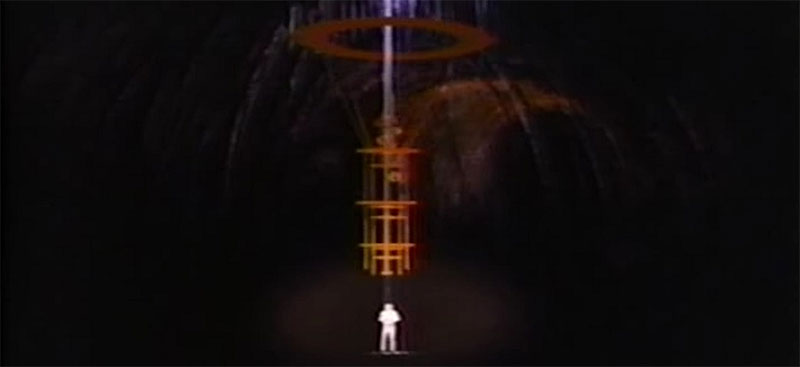
Devices in the cave that look like the inspiration for Tron’s battle with the MCP allow Questor to regain his full memory, but he still lacks the ability to feel feelings and stuff. He also discovers the immobile body of Vaslovik on a plater, barely able to speak. Vaslovik tells him they are both part of a line of androids left on earth by ancient astronauts, sent to keep humanity on the right path to survival and peaceful coexistence through careful manipulation. The premise is the same as Roddenberry’s unsuccessful pitch for the Star Trek spinoff, Assignment: Earth with Questor as Gary Seven and Robinson as Roberta Lincoln. Since the spy chamber is in Lady Helena’s compound I suspect she would have been Isis.
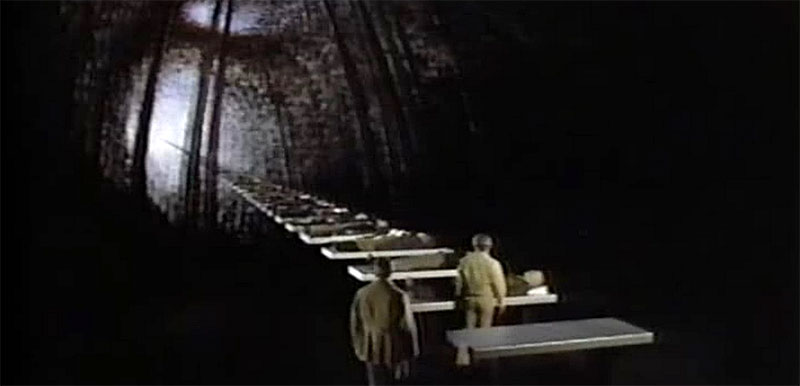
Behind Vaslovik is a mile long line of platters each with its own dead robot on it. All of them male. All of them white. Questor’s platter is the last. If humanity hasn’t shaped up by the time he expires it simply never will.
Questor being part of a long line of white guys secretly keeping the world safe is the ultimate mighty-whitey fantasy and a disappointing one coming from Roddenberry. Earlier in the movie, when Darrow is told Questor has taken on “medium/fair skin tone” he responds, “in other words he appears normal.” So the rationalization – its mere existence mildly shocking – is that white people blend in more easily, but on a global scale that’s simply not the case. In fact, in most places a white guy is a symbol of the worst kind of interference, colonialism. Making Jerry Robinson a person of color would have had its own bad implications. The ethnic sidekick is not the best casting decision in the world. But Questor could have easily been an ambiguous shade of light brown allowing him to pass as a native in many parts of the world including Latin America, the Middle East, South Asia, and even the U.S. Making the character a woman could have made her seem even more deceptively innocuous to the people around her. What the Genes meant by “normal” is normal to the owners of Nielsen boxes.
Darrow has been secretly listening to this whole schpiel about carefully tweaking the world and begins actively wrestling with it. On the one hand, the very idea that aliens are secretly involved in human affairs is terrifying to him. On the other hand, he’s never understood how humanity made it this far, and Questor’s answer is as likely as any. In the end Darrow joins team Questor. He grabs the tracking device and takes off in Questor’s jet in order to lead away the military units he brought with him. They shoot him down, much to the horror of his new partners. With Questor assumed dead he’s free to move forward with his mission without any foreseeable meddling.
I get the reasoning for Darrow’s death. It was Roddenberry and Coon’s way of showing how redeemable human kind is. The problem is it doesn’t make a whole lot of logical sense. It never answers the mystery of Darrow and where his power stems from. It’s also completely avoidable. Darrow could have said he killed Questor or that Questor got away or was never there to begin with. He could have just dismissed the army right then and there without any reasoning at all. And there’s a multitude of ways he could have used that transmitter to throw off the trail that wouldn’t have involved his death.
But, most of all, Darrow would have made an unbelievably great recurring villain because he is the only real foil for Questor – not as a brutal enemy – but simply as a person with a different world view. Their interactions are the most interesting in the film. Where Questor wishes only to feel emotions, Darrow calls them an impediment. They both envy each other while giving themselves too little credit. Robinson would have helped Questor guide humanity with a sense of morality the android lacks, but Darrow would have questioned the legitimacy of any alien interference. Perhaps he could have even brought up the point that any action is immoral if it is secretive and therefore nonconsensual. And, sure, humanity has survived, but at what cost? Where were these alien robots when the New World was colonized or during the Holocaust? An overseer who is not a god can be held accountable to these questions. If done right, and this pilot indicates it could have been, Darrow would have been more than just a snarling antagonist without reason. He would have been a sensible counterpoint to Questor’s mission. I could see them engaging one another with Questor not always being right. If Questor is Data then Darrow is Mirror Spock with the entire empire backing him up. What a match that would have made.
The biggest tell that this is a Roddenberry/Coon production is its pacifistic tendencies. Questor can’t kill and he can’t take action directly. He can only help the right people and foster the right attitudes to maintain peace. Making war is not in his programming, only stopping it. Nothing less could be expected from Roddenberry, whose space navy was packed with officers that never saluted on a mission of science and diplomacy. But it’s also a major part of Coon’s philosophy as well. This is the guy who wrote “Errand of Mercy”, in which Kirk admits that fighting for the right to make war is the most embarrassing thing he’s ever done. Coon also created benevolent monsters and misunderstood combatants. Could you imagine how many modern wars could have been avoided if we tried to understand our enemy the way Kirk understood the Gorn?
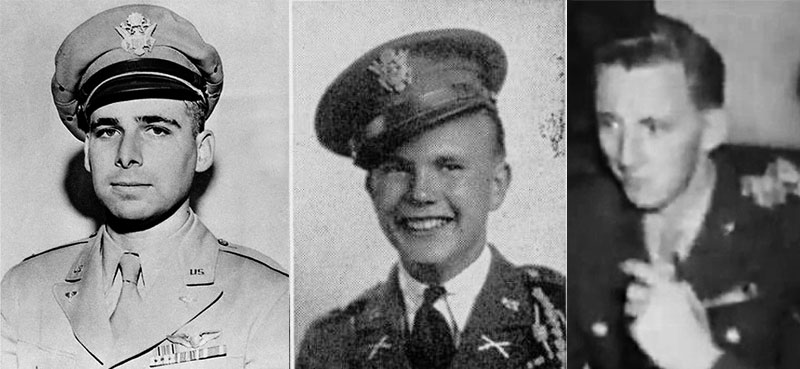
And the funny thing is, these guys were military men during the most intense conflicts of the twentieth century. Roddenberry flew an almost uncountable number of missions over the South Pacific in World War II. Coon was a marine throughout the entirety of the same war and was called back into service to fight the North Koreans. And it wasn’t just them who contributed to Star Trek’s pacifism. Matt Jefferies, who was an air force bomber in the European theater, created a starship with sparkling sails and not a single visible weapon on her hull; only windows for admiring the limitless potential of the universe.
But let’s get back to Coon and “Errand of Mercy”. I could make the case that this episode is one of the most successful anti-war stories put on television. All the murder is off screen and all the pyrotechnics are non-fatal. Even Kirk warns they’ll only kill the enemy if absolutely necessary. They never do. And every single time the audience thinks a big, satisfying battle is about to erupt it’s halted in its tracks. Violence interruptus on a planetary scale. In one swift stroke, “Errand of Mercy” made not just sure that Star Trek wouldn’t become a war story, but, because of the Organians, physically couldn’t. That’s because Coon understood, like only a soldier could, that showing violence, no matter the context, is glorifying it. Anthony Swofford, a veteran of the first Gulf War, said as much in his 2003 book, Jarhead, when he described marines using films like Apocalypse Now and Platoon to amp themselves up for battle.
If you really want the numbers on how fully the original series skirted war, out of eighty episodes only thirteen featured ship to ship skirmishes. Of those only six featured the Klingons or Romulans, three were against unmanned vessels, and one was friendly fire. In three episodes the Enterprise doesn’t even fire back.
It’s hard not to point out that when Star Trek finally did its take on zooming fighters and lumbering capital ships that have all the relevancy to modern warfare as trenches and gravity bombs, it was written by people who never actually saw conflict. That’s not to say their stories didn’t push the narrative that war is heck, but you have to admit it is an interesting contrast. In the end, we all have to understand why we produce and consume stories about war-based violence – or any kind of violence – and what their actual, not intended, messages are. It’s not unreasonable to consider how stories could be colored by experience or the lack thereof.
The Questor Tapes is a worthy effort from two people interested in peace and international cooperation. It avoids any real violence, takes a Gandhi figure and makes him a hero, combines cold logic and human morality into a tool for justice, and turns its only villain into a champion for the greater good. Sure, it comes off as bland, but the world needs a little bland every once in awhile.
Random thoughts and observations
- Gene Coon died of lung cancer before Questor aired. He was 49 years old.
- From its graham cracker-esque leading man to its colorless environments to its slow pacing and overly intellectual script, everything about this movie is a harbinger of Star Trek: The Motion Picture. But, also like TMP, it features some interesting cinematography and a killer soundtrack.
- Majel Barrett sighting: She’s one of the scientists in the opening scenes. When her voice comes over the intercom it’s like magic.
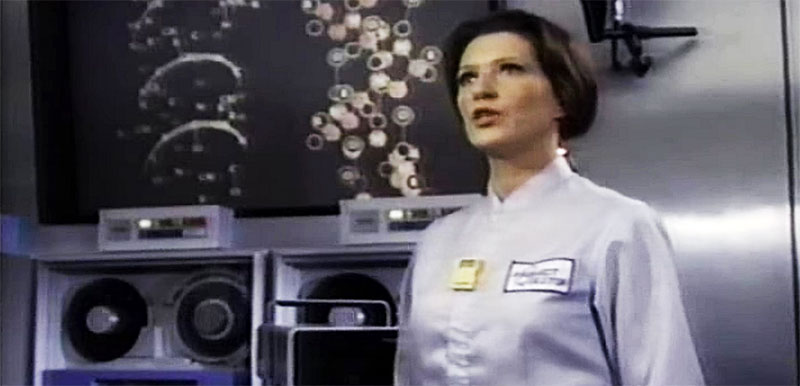
- Walter Koenig has the saddest cameo ever as Darrow’s assistant. He has two scenes and only one line. Between the wide shot and his enormous mustache he’s unrecognizable.
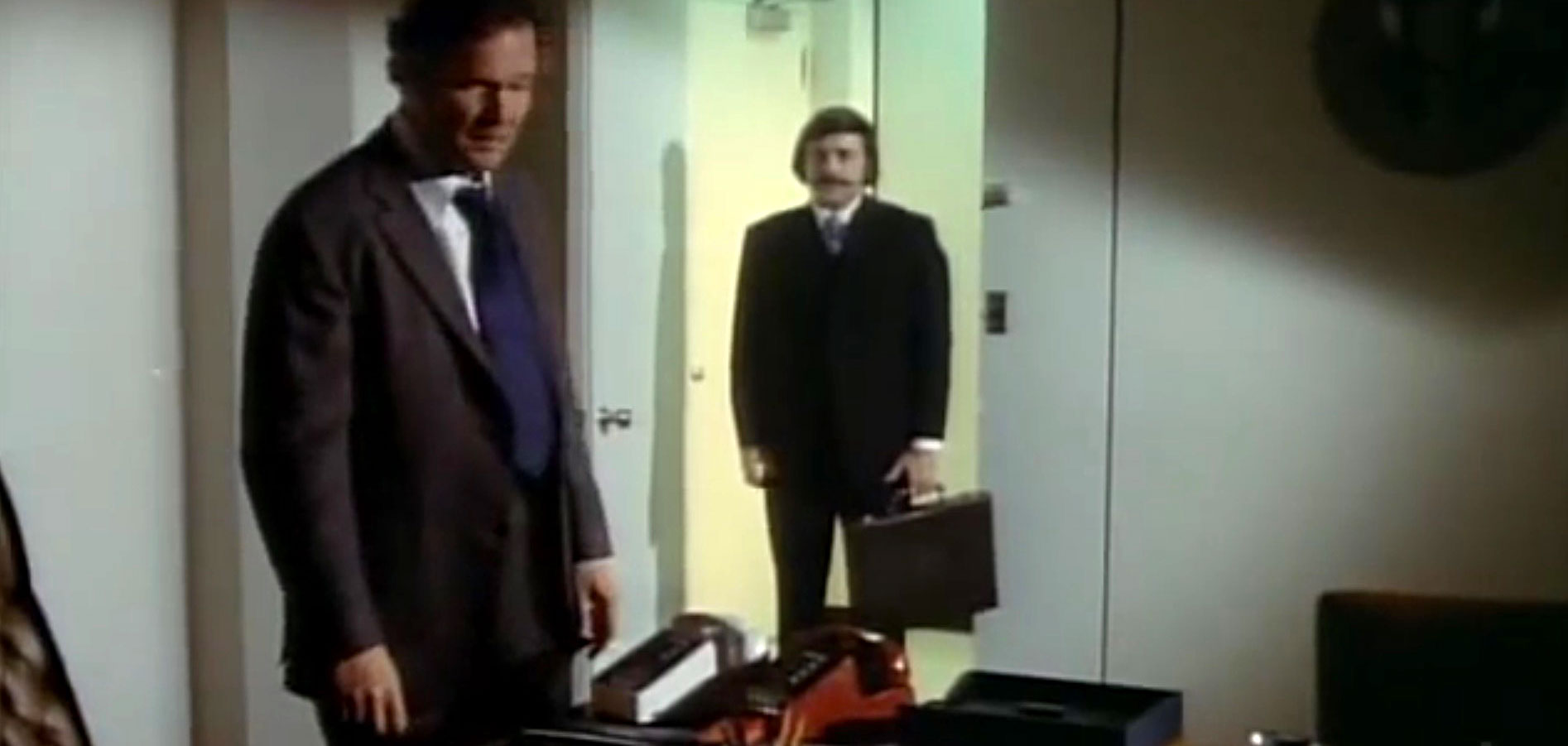
- Robert Foxworth would go on to play a crooked admiral in DS9 and a corrupt Vulcan leader in ENT.
- There is one non-white character in the film. James Shigeta, who was nearly as prolific a character actor as John Vernon, plays one of the scientists on the international Questor assembly team.
- Some of Robinson’s dialog with Questor is heart-melting in its sincerity. “I never put together anything that said ‘Jerry Robinson I need help’,” is a particularly great one.
- More shades of “Spock’s Brain”: Questor’s computer interface looks a lot like the Eymorg’s “Great Teacher”.
- The title is more exciting than usual with two fonts used. The main one is Futura Display SH Regular while the smaller font is a vertically compressed Helvetica Neue LT Std 83 Heavy Extended. Helvetica? Really?
Next up: Planet Earth.

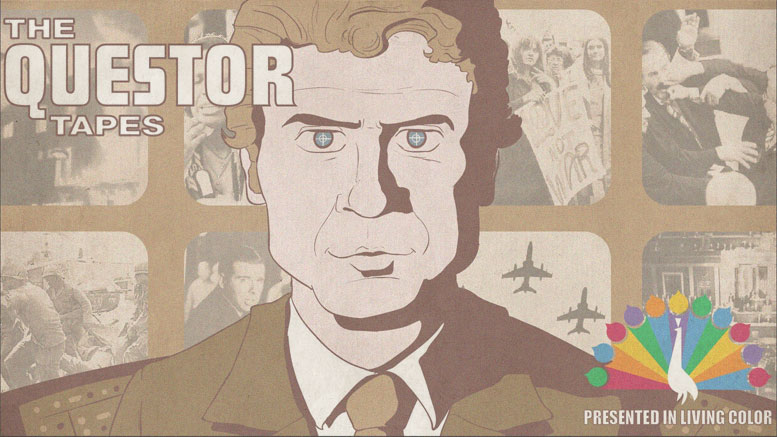
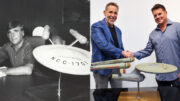

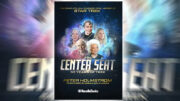

So, Questor is where Data came from.
Cool.
I thought he came from Bishop in “Aliens”.
Tasha Yar was based on Vasquez in Aliens. Data is all Questor.
@Mark2000
Side note: I recall from a friend who pitched a story to TNG (shortly before his untimely death), that the Tasha Yar character in the original TNG series “bible” was originally a Latina named Macha Hernandez.
That’s correct, and Marina Sirtis would have played her. Denise Crosby was supposed to be the triple or quadruple breasted Counselor Troi. But they switched them up and Troi, thankfully, due to D.C. Fontana’s complaints, got a breast reduction.
Yikes! re: the multiple breasts. Not only silly, but didn’t work in either Total Recall or ST:TFF.
As for my friend’s TNG pitch treatment, it was rejected, but used without credit anyway. By that time he was dead, therefore unable to go to the WGA or his agent…
Mark2000, Vokar,
Re: multiple breasts
It’s a faint memory, but I seem to recall the first BATTLESTAR GALACTICA series pilot snuck a more than twin-breasted endowed sentient creature on screen. So faint it could be confusion from something else. I have a strong recollection of surprise that it got through but it was so fake that I suspected that may have been why.
It worked fine in Total Recall because it was a ‘couple-second scene’ of said lady in two scenes in the movie.
Questor predates Bishop by several years.
I suppose its unavoidable to inflict today’s standards over the past. When this first aired it was quite imaginative and good. I own a copy of this that a friend transferred to DVD from VHS and recently watched it. I thought it held up well – but then most people reading this were probably born many years after this aired.
As I recall this came very close to being picked up as a series. Too bad it didn’t. The concept is still a good one.
Not sure why the snarky tone of the review (see also Genesis II review. Graham Cracker-esque leading man? Colorless environments? Harbinger of TMP? Those are fightin words! ;p
Coon was all about good race relations (see his 1959 BONANZA The Paiutte War) so any issue over the robots being white is either GR or just an observation about the nature of the times in which we lived then, certainly not a prejudice-based bias.
Except that his only description of the Klingons was “Oriental”. So there’s that.
Script format is shorthand communication, and that got the point across to folks. AFAIK, the differentiation on asian and oriental (one being race, the other more about appliances and such) didn’t take hold till the 70s, either, though it could be I was brought up someplace backwards (SF bay area) that didn’t know the difference till 80 or so.
The point is not the term “oriental”. I’m not going to engage in whether that was an appropriate thing to say in 1966. The point is Coon wanted the Federation’s new arch-enemy to look like a Fu Manchu stereotype. That puts Star Trek on the same level as Flash Gordon on the “yellow peril” scale.
Boy, after reading THAT, now I’m with the others about you and your take on things; you really are seeing the wrong (as in, nonexistent, made-up) point, something that should be obvious if you knew Coon’s respect for what we’d now call diversity (and I’ve read his novel, so I know how biased his characters can be there, but that was also a black comedy a la CATCH-22, so it is about context as well.)
Article: maybe a B-minus, but aftermarket comments, a D at best, and that is only so high because you do at least get across a POV (even if it makes you sound an arrogant nitwit who revels in his nitwittiness.)
“You’re so wrong!” You say, while not providing a reason why Coon would use that term other than that, in your mind as a person who lived back then I guess, it was acceptable. You also have no response to why an enemy has the same facial hair as an ugly, overused stereotype. Googling ‘Klingon Asian’ brings up hundreds of discussions and articles on the subject. The Wikipedia article on Klingons describes them as having Asian facial hair. But because Coon wrote a book that is “diverse” he could never again make a mistake or have any prejudices. Sure thing.
…Which was acceptable at the time, like the term “colored”. As easy as it is for us now to judge history, hindsight is 20/20, and it is unfair for us to judge those of the past in most cases. This is one case.
Questor was another character dug out of the archive and recycled for TNG. I saw this film many years ago on a British TV station and sat up when I saw the two Genes were involved. I remember it being a bit of fun and wouldn’t mind seeing it again. It’s easy to sneer at a 40-year-old production from a 21st century viewpoint where the culture, these days, is one of sneering at everything, but it should be taken for the fun film it is.
In trying to sound cool and ‘down wit’ da kids’ the reviewer makes some crass and unfair remarks about Mike Farrell. Mike Farrell wasn’t any kind of ‘second choice’ to appear in M*A*S*H*. Farrell was the first original character cast for the TV show following the between-seasons departure of Wayne Rogers who played ‘Trapper’ John MacIntyre, a character from the novel and Robert Altman film. Harry Morgan debuted as Colonel Sherman Potter in the next episode, following a ‘flash forward’ at the send of Farrell’s debut episode. He also didn’t grow the moustache until later on in the show. Indeed M*A*S*H* stayed successful and widely watched in that era in a way TV Star Trek could only dream of because it cast actors as radically different characters when other actors departed. BJ Hunnicutt, if anything, eclipsed the memory of Trapper John.
Any ‘blandness’ about Questor is down to the people making the film. I seem to remember there was talk some years back (in the time of Andromeda and Earth: Final Conflict) about a new adaptation.
Wow. I’ve spent three reviews now picking apart The Great Bird of the Galaxy’s motives, talents, and sexual predilections, but Mike Farrell jokes are where people draw the line?
Would you like my non-hipster doofus take on Mike Farrell? I don’t hate him, but I don’t think he’s a good actor. He’s very much like Jerry Seinfeld, who freely admits he is not a good actor. His reactions seem half felt and almost jokingly manufactured. His earnest line deliveries sound stagey. This is fine for the straight man to a genius like Alan Alda or for the many dads, folksy doctors, and Matlock extras he’s played through the years. It cannot carry a show where he is the only emotional presence the audience has to rely on. Period. NBC obviously agreed because they did not want his character on the show at all, and it’s my opinion that Farrell effected that decision. He couldn’t sell the role. Other casting directors also agree. Farrell’s filmography is nowhere near as varied or impressive as John Vernon whom I spent a paragraph demanding more of.
While bashing Farrell I also consistently complemented the writing he was given to deliver over and over and over and over again while also praising the potential and direction the series could have taken. If there was a problem with it it was indeed the actor.
As I recall from the word that got around in the 1970s, NBC didn’t want to get rid of Mike Farrell’s character because of a problem with the actor. Instead, NBC wanted to alter the focus of the series into Questor trying to fulfill his mission to help humanity while trying to avoid being caught by some government agency that was after him. Essentially, making it into yet another copy of premise “The Fugitive,” which tended to happen to many science fiction shows of that era (Like Logan’s Run, Incredible Hulk, The Invisible Man, and The Immortal, to name but a few. Heck, even Battlestar Galactica is a variation on that premise). By getting rid of Robinson, Questor could more easily fit into the wrongly persecuted Richard Kimble archetype being chased by his own version of the relentless Philip Gerard.
He’d also fit into these similar scenarios:
Paul Forrester, aka ‘The Starman’ and son on the run from the NSA while looking for Starman’s human love Jenny (Starman)
Zeta and Rosalie Rowen running from the NSA while looking for Zeta’s creator (The Zeta Project
@Mark2000. I’m not disagreeing with your right to assess Mike Farrell’s abilities or necessarily all of your ‘tone’ of discussion. I regularly defended Dennis Bailey’s reviews here when the Church of Roddenberry mob had their usual sense of humour bypass in the comments section and I’ve enjoyed your other articles.
***However*** (or should that be H*O*W*E*V*E*R*?) to do a funny takedown of Mike Farrell, by spouting things that aren’t true simply looks like bullying. There are plenty of humorous digs you can use, but what you basically said was that Mr Farrell was too rubbish even to be first choice as Hawkeye’s wingman in M*A*S*H* which isn’t true and therefore isn’t funny. Mike Farrell was cast as a replacement for another character well into the show’s run after that actor left. And the moustache Hunnicutt eventually grew was actually the butt of numerous jokes across the series. Not to mention you actually lay into the character Farrell played, who was popular enough to last years longer than his predecessor and arguably eclipsed him. The whole reason Hunnicutt existed was that he was meant to a quiet, ‘mayonnaise,’ decent family man to counterpoint the more oddball aspects of Hawkeye, Burns and, later, Winchester. It actually takes a talented, unselfish actor to play the straight man; see Ernie Wise. The Decker comparison couldn’t be less accurate (and Stephen Collins was solid actor who never quite got his break – I rather liked Tales of the Gold Monkey at the time though!)
M*A*S*H* was a constant in my childhood and I saw the final episode on its original screening in the UK, so I remember all it well when it went out. If you remember seeing the farewell scene between Hawkeye and Hunnicutt in the final episode at the time, you wouldn’t perhaps be so cynical.
Please continue to write the articles, but there’s plenty of fact you can use to spoof these fun old productions without resorting to make things up. The hipster doofus act has its limits and you’re clearly intelligent enough and a decent enough writer not to need to resort to it. Thanks for your response and I look forward to your next article.
Tone is the ultimate ad hominem. Snarky, angry, uppity, emotional. All great terms to dismiss people in a way that is impossible to defend without being accused of more of it. I have no desire to discuss my tone with you, because a command for a proper tone is a command for respect, of which I owe no one outright. You don’t rank me and you don’t have pointed ears. My tone irrelevant.
@Mark2000. I criticised your article because you printed a falsehood about an actor in order to justify your dismissal of his performance. It was a mean thing to do. A is A. If you’d said you didn’t like the choice of the makers of M*A*S*H* to cast Mr Farrell as Wayne Rogers’ replacement because you thought he was bland, I doubt I’d have even paid much attention to it, as everyone has a right to an opinion.
That’s not ‘tone’ and I wasn’t criticising your ‘tone.’ I have every right to judge you on smearing an actor who can’t respond when you publish the article and to call you out on it.
LOL. There are several posts from you up and down the comments section about what a whipper-snapper I am and how I’m using this newfangled snark the kids all love. You just want to have a beef with me and you’re welcome to it.
Mark that ‘mayonnaise’ line is a classic. LLAP
Nice review, but what year was this pilot made? Did I miss it in the article?
Made 1973, aired early 1974.
Much appreciated, thanks!
Mr. Farinas’s review comes across as rather arrogant and full of himself. He needs to town it down a few notches. Then I might take what he wrote a little more seriously.
Yeah, he takes the unfortunate modern approach of sneering at everything. If a person can’t respect the the source material (respecting something is different from liking of disliking something) then they’re best off not bothering. The review just irritated me, in part because the derisory remarks made about Mike Farrell were factually incorrect.
Hear hear. Mike Farrell is a fine actor. The reviewer’s dismissive comments about him make me distrust his judgment about this project.
Believe me Dom, I was toning it down big time for him. I recall watching Questor some time ago. No, I didn’t think it was very good but this guy… No, I’m not going to wade in on it.
“And the funny thing is, these guys were military men during the most intense conflicts of the twentieth century.” — wouldn’t that put any normal person off conflict for life? I mean, seriously? The way this review reads, it’s like that it’s a bit surprise to you that writers who saw people being killed on a daily basis should be become anti-war afterwards.
Ah, but to have seen Assignment: Earth.
…and did you notice, Gene through a bone to Bjo Trimble and her husband by naming a character after them.
I meant to say “threw them a bone”…..and Stephen Collins as Decker, the character was written poorly and he and Ilia were ill conceived. He was a nice looking charismatic actor…just given a poorly written/conceived part. “Star Trek II” worked because the original cast led the story….in “The Motion Picture” it was about Vger and to a lesser extent Decker and Ilia…the Enterprise crew was just along for the ride.
“but the joke wreaks of Coon”
reeks
What is with the obsession over race? I can’t even imagine living my life in a manner where I go over media with a fine toothed comb picking out racial makeup. Why would you dwell on that?Ridiculous.
I noticed that too.
It’s only an “obsession” if you’re uncomfortable with having your assumptions of what constitutes “normal” challenged.
Moeskido, Seconded.
As the reviewer pointed out, “Normal” was represented as being the same as the folks who influenced TV ratings; i.e., ‘Nielsen Families,’ who were probably white, middle-class folk.
Mark2000 is absolutely right about casting a Latino or light-skinned African-American actress. But keeping in mind all the crap Roddenberry went through to get a multi-racial cast on Trek, and the really bad crap he caught for casting Majel as Number One, I can see why these “Mayo-NNAISE” casting choices were made.
I remember loving that movie. I liked Robert Foxworth as the innocent Questor. I didn’t remember much else about it until I read the review here, so, despite the snark, it was a nice trip down memory lane for me.
Majel’s casting was not objected to for the bullcaca reasons Roddenberry’s always stated; it was because she was his mistress, and also (according to Herb Solow in the book Star Trek: The Real Story) she couldn’t act.
Dusty,
Re: bullcaca reasons Roddenberry’s always stated
You mean the same ones that Solow, himself, claimed?:
“Majel Barrett was dropped as Number One because the network had trouble with
a female in a position of authority.” – Herbert F. Solow, from THE MAN WHO BOUGHT STAR TREK by Ian Spelling, STARLOG #241, P74, August 1997
https://arch|ve.org/stream/starlog_magazine-241/241#page/n73/mode/2up
Herb and Gene were both working entertainment executives in the same era where to be successful they BOTH employed the same amount of bull, hyperbole and self-contradiction to promote themselves and their productions. The truth lies somewhere between the two extremes of the tales they tell and NOT lopsidedly all on one version over the other.
Dusty,
This site’s moderator bot has trouble with the word “arch|ve” the | needs to be replaced with the letter “i”.
Whatever, I was alive in the ’60s and women were nearly always cast in “helper/helpmeet” roles. Number One would have been a challenge for some viewers and definitely for NBC execs.
Majel [personal status with Roddenberry notwithstanding] acted the part of Number One quite well. The character’s authority resonated, while the lovelorn Nurse Chapel [the kind of role most people chuckled at in those days] did not.
@Marja:
Majel’s Number One was by far the most interesting regular character in the first pilot. Too bad the NBC execs were so damned afraid of her.
These reviews are very clear about their focus, which is all the usual stuff one talks about when discussing Roddenberry and Star Trek: Diversity, sexual politics, pacifism, and futurism. I’ve done this with all three so far. In this case I spent one paragraph and some odd comments on race, two paragraphs on sex, and four or five on pacifism. You’ve decided to pick the racial part as your point of contention meaning you are at least as “obsessed” with the subject as I am.
I’m glad that certain people are happy with their representation in media. Some of us are not. We do think about it, and there is no shame in that. Considering how aggressively the “satisfied” people insist on maintaining status quo, they are certainly examining everything in terms of race as well. Don’t call a kettle black, if you are a pot.
Brilliant and sharp observation about the World War II combat veteran generation and pacifist stories vs. 1990s writers and cool space wars with stuff blowing up everywhere. I remember when Gene Roddenberry was so adamant about this that I think he tried to stop the Star Trek V computer game from including a fight with a Klingon warship unless it were depicted as a mere simulation.
As always, an excellent observation on another artifact from another time. I fully agree with the idea that Darrow would have made an excellent continuing foil. The final five minutes of the movie appear to me as though they were trying to edit around a lack of available footage. I’d expect the production’s budget ran a bit thin at that point. Perhaps Darrow’s sacrifice was a quick solution to that.
Some commenters here might want to learn more about the genuine differences between what they’re calling “sneering/snarky” and legitimate story criticism. That Mr. Farinas uses a good bit of a sardonic tone in no way diminishes the validity of his analysis of the writing and presentation of GR’s work. Nor does it hide his obvious affection for the material, either.
The movie’s soundtrack was by the great Gil Melle, a phenomenal jazz musician who also created a good number of tv and movie soundtracks, including including The Andromeda Strain, the Six Million Dollar Man pilot, and episodes of Columbo. I sure wish this one was available at retail.
‘You know a movie is going to be mayonnaise on white bread when the guy who was the second choice to play second banana to Hawkeye Pierce is one of the stars. I mean, the only thing interesting about Captain B.J. Hunnicutt was his mustache and double entendre initials.’
As I pointed out elsewhere: crass, snide and inaccurate. I don’t mind jokes, but if I want humour I’d rather read Douglas Adams or PG Wodehouse. If the reviewer considers Mr Farrell’s work bland then just say so without sneering about his most famous role in a show that, in its prime, got viewing figures that would make Star Trek fans faint.
FWIW, I enjoyed Farrell on M*A*S*H. He was a very good straight man for Alda’s Hawkeye, and I know his presence helped make many of their scripts better. I can feel that way and still have enjoyed the review above.
Sheesh.. What a snarky “holier than thou” review. Judging a product created in a decade before all the social information we have now is misguided and uncalled for.
And I don’t share your insulting comments about Mike Farrell. How are acting chops?
Regards.
Another bit of trivia – the music from the opening scene, which shows Darrow walking into the lab, became the theme for “Kolchak: The Night Stalker.”
I’m ducking now to avoid the comet David Gerrold will send your way when he reads that you’re accusing him of ripping off Heinlein. (He acknowledged his concerns, but the two stories are very different.) I have no idea why you’re also down on Mike Farrell, or M*A*S*H for that matter. I gave up on the rest of your review. I like facts more than snark.
If it’s a review, apparently snark is allowed. The snarkiest movie reviewer I’ve read is Anthony Lane of the The New Yorker magazine. Like Mikey, he “hates everything.” Almost.
Mike Farrell. I really liked him in M*A*S*H; even more, I daresay, than Wayne Rogers! He was a little “’80s” for the ’50s, but the writing was a modern take on the Korean War, not a faithful recreation ….
I’ll take snarky for Rogue One.
I like the movie fine, but there are certainly openings to nerdle on.
Hope this isn’t a spoiler, but one word: freckles????
It’s possible the reviewer didn’t mention this fact because it could likely have taken the article into another tangent other than being a review of the show as aired, but the actor originally signed to play Questor was none other than Leonard Nimoy. He discusses it at length in Shatner’s “Star Trek Movie Memories,” as another fracture in his relationship with Gene Roddenberry. It’s interesting how Star Trek’s two leading men apparently had very different relationships with Mr. Roddenberry.
Yeah…in the future, the writer should avoid injecting his SJW-ism when deconstructing GR’s works. Just play it straight. Otherwise, the commentary comes off in a way I can’t take seriously.
LOL, if you’re not into social justice issues then maybe Star Trek is not the franchise for you.
Big Jim,
:-D
Naw, I just believe in, I don’t know JUSTICE. You know, the kind that includes such antiquated notions as “due process” and “equal protection under the law”? Maybe STAR TREK isn’t for YOU, ne?
Due process, huh? I’ve written a lot of controversial stuff in my day, but I’ve never endangered or bypassed anyone’s legal rights before. What incredible power I have. I must be careful in the future.
I remember seeing this as a very young boy in the mid ’70’s, so it must have been its UK premier.
There are a few scenes that have stayed with me, like where they are trying to activate Questor and the following scenes where he melts his face on. Found those quite creepy and disturbing. Also remember the last scene in the cave with all the androids stretching out into infinity on those tables.
Would love to rewatch it but I’m guessing it looks massively dated now.
Clever premise but could it have sustained an entire series? I am not so sure…
Lieutenant Data?
Finnegan
Re: Lieutenant Data?
Well, he was a Lieutenant commander. Can’t say I ever fully understood the protocol by which everyone seemed to address him as Commander Data?
A Lieutenant Commander is referred to as “Commander” not “Lieutenant”. In the ground services a Lieutenant Colonel is referred to as “Colonel”. Data being called “Commander Data” was proper.
Finnegan,
Re: Lieutenant Data?
That Lieutenant Commander abreviated formal protocol is something unique to my country’s US Navy but I’ve always found to not use the full rank in address but to advance it to the next one peculiar — always struck me as an unearned promotion solely based in the name of abbreviated expediancy, and arbitrary as I don’t recall Petty Officers ever being addressed as Officer this or that.
It was definitely easier to say than “Lieutenant Commander Smith” or Lieutenant Junior Grade Jones,” but you’re right; as a Petty Officer I had to insist on being addressed by my enlisted rank and last name. Most of the time people resorted to first names, which I found patronizing. I earned my rank. Some shortened it to YN1.
A student at our National Search and Rescue School who was from Papua-New Guinea complimented me on my pretty name, Yni :-)
Thank you for this wonderful series of articles. I own every one and love each one for it’s own merits and demerits. I for one hold Questor Tapes in a special place of my youth. I really enjoyed it when it originally aired and now my repeated viewing because of the concept of an ancient race guiding us was mid blowing at the time and I thought well presented.
Also I have thought for an article that comes up during this. When you talk about the use of voice. Robert Foxworth, along with many other actors, I think was cast because of voice. He had learned how to use his voice very well since Questor was made and continues to. I think a focus on voice actors in ST might be interesting.
Just a thought. And again, I sincerely appreciate your series and articles. Well done!